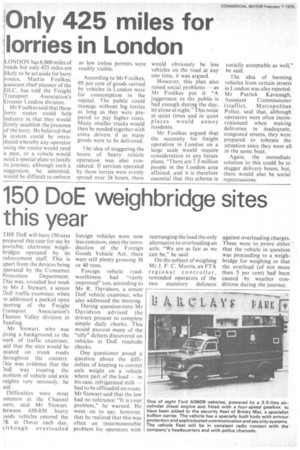Only 425 miles for lorries in London
Page 22

If you've noticed an error in this article please click here to report it so we can fix it.
LONDON has 8,000 miles of roads but only 425 miles are likely to be set aside for lorry routes, Martin Foulkes, assistant chief planner of the GLC, has told the Freight Transport Association's Greater London division.
Mr Foulkes said that these lorry routes could help industry in that they would firmly establish the presence of the lorry. He believed that a system could be introduced whereby any operator using the routes would need a pass, or a vehicle would need a special plate to justify its journey, although such a suggestion, he admitted, would be difficult to enforce as law unless permits were readily visible.
According to Mr Foulkes, 95 per cent of goods carried. by vehicles in London were for consumption in the capital. The public could manage without big lorries as long as they were prepared to pay higher costs. Many smaller trucks would then be needed together with extra drivers if as many goods were to be delivered.
The idea of staggering the hours of heavy vehicle operation was also considered. If services operated by these lorries were evenly spread over 24 hours, there would obviously be less vehicles on the road at any one time, it was argued.
However, this plan also raised social problems — as Mr Foulkes put it: "A juggernaut to the public is had enough during the day, let alone at night." This noise at quiet times and in quiet places would annoy residents.
Mr Foulkes argued that the necessity for freight operation in London on a large scale would require consideration in any future plans. "There are 7.3 million people in the London area affected, and it is therefore essential that this scheme is socially acceptable as well," he said.
The idea of banning vehicles from certain streets in London was also rejected. Mr Patrick Kavanagh, Assistant Commissioner (traffic), Metropolitan Police, said that, although operators were often inconvenienced when making deliveries in inadequate, congested streets, they were prepared to tolerate the situation since they were all in the same boat.
Again, the immediate solution to this could be to stagger delivery hours, but, there would also be social repercussions.












































































































































